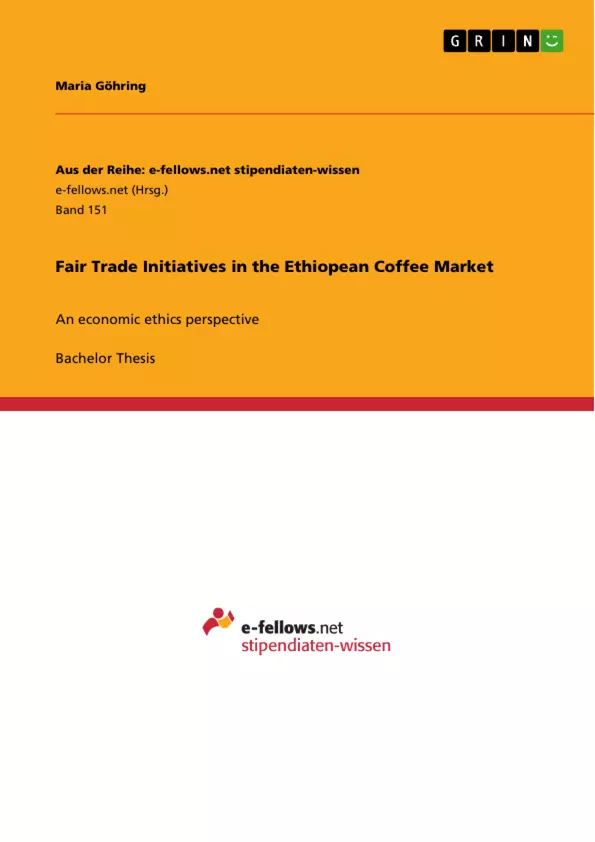In public perception, Northern countries accumulate wealth at the costs of Southern countries. Therefore, Fair Trade has been born to abandon the unfairness within the North-South trade relationship due to globalization and to create fair rules for world trade. Coffee is hereby of symbolic character for the global Fair Trade movement and has still the largest share within the Fair Trade market. Furthermore, its origin lies in Ethiopia. Accordingly, it is the largest African coffee producer and still provides the original Arabica coffee bean that shows the greatest genetic pool in the world. Therefore, in the following paper Fair Trade in the Ethiopean coffee market will be analyzed from an economic ethics perspective applying the Ordonomic research approach. This is a rational choice analysis which looks on the interdependency of institutional rules and mind categories within the globalizing context. By using the three-tiered model, answers to three main questions will be given. The first concentrates on which dilemma structures are prevailing in the North-South trade relationship. The second focuses on conflicts which are present in public discourse and finally the third question asks for implications that are given for the rule-setting process and how Fair Trade works hereby as an instrument of New Governance. It will be shown that moral commitments initiated by Fair Trade help to overcome prisoner dilemmas and the deficit rule-framework in the global coffee market. New Governance and Global Corporate Citizenship are thereby complementary. Finally, Fair Trade will be examined with regard to its sustainability according to the three ESG criteria of sustainability. The focus is hereby set on success as well as challenges and deficits FairTrade faces nowadays and in future.
Inhaltsverzeichnis (Table of Contents)
- Introduction
- Fair Trade within the coffee market.
- Fair Trade development as response to globalization
- The coffee paradox and fair traded coffee in Ethiopia
- New Governance from an Ordonomic perspective.
- New Governance supporting state: Analysis based on the three-tiered model
- New Governance types of commitment
- Individual self-binding commitments....
- Collective commitments..
- Binding services.
- Fair Trade as an instrument of New Governance: Analysis from an Ordonomic perspective
- Identification of dilemma structures from North to South
- Solution approach through Fair Trade along the whole value chain...
- Individual self-binding commitments within the coffee market.
- Collective self-binding commitments within the coffee market..
- Binding-services within the coffee market.
- Properties of Fair Trade: Challenges and deficits in day-to-day application
- Conclusion
Zielsetzung und Themenschwerpunkte (Objectives and Key Themes)
This paper analyzes Fair Trade in the Ethiopian coffee market from an economic ethics perspective, employing the Ordonomic research approach. It examines the interdependency of institutional rules and mind categories within a globalizing context. Using a three-tiered model, the paper explores the dilemma structures prevalent in North-South trade relationships, the conflicts present in public discourse, and the implications for rule-setting processes within the global coffee market.
- Examining the ethical implications of Fair Trade in the context of global coffee trade.
- Analyzing the role of Fair Trade as a tool for achieving more equitable trade relations between North and South.
- Exploring the potential of Fair Trade as a vehicle for New Governance and Global Corporate Citizenship.
- Evaluating the sustainability of Fair Trade initiatives in the Ethiopian coffee market.
- Identifying the challenges and deficits faced by Fair Trade in its implementation.
Zusammenfassung der Kapitel (Chapter Summaries)
The first chapter introduces the concept of Fair Trade and its development as a response to globalization. It then delves into the specific context of the Ethiopian coffee market, highlighting the "coffee paradox" and the role of fair-traded coffee in Ethiopia. The second chapter provides an Ordonomic perspective on New Governance, analyzing its role in supporting the state and exploring various types of New Governance commitments. The third chapter analyzes Fair Trade as an instrument of New Governance, identifying dilemma structures within North-South trade relationships. It explores solutions offered by Fair Trade along the entire coffee value chain, focusing on different types of commitments. Finally, this chapter examines the properties of Fair Trade, highlighting its challenges and deficits in daily implementation.
Schlüsselwörter (Keywords)
Fair Trade, Ethiopia, coffee, North-South trade, globalization, New Governance, Global Corporate Citizenship, Ordonomics, dilemma structures, prisoner dilemma, sustainability, ESG criteria.
Frequently Asked Questions
What is the "Coffee Paradox"?
It refers to the situation where global coffee sales are booming and prices for consumers are high, while the prices paid to the farmers in producing countries like Ethiopia remain extremely low.
How does Fair Trade help Ethiopian coffee farmers?
Fair Trade provides a minimum price floor and a social premium, helping farmers overcome "prisoner dilemma" structures where they would otherwise be forced into harmful price wars.
What is the Ordonomic research approach?
Ordonomics is a rational choice analysis that examines how institutional rules and mental categories interact to solve social dilemmas in a globalized economy.
Why is Ethiopia significant in the coffee market?
Ethiopia is the birthplace of Arabica coffee and possesses the world's largest genetic pool of coffee beans, making it crucial for global coffee biodiversity and quality.
What are the challenges Fair Trade faces today?
Challenges include high certification costs for small farmers, market saturation, and the difficulty of ensuring long-term sustainability across all three ESG (Environmental, Social, Governance) criteria.
- Quote paper
- Maria Göhring (Author), 2011, Fair Trade Initiatives in the Ethiopean Coffee Market, Munich, GRIN Verlag, https://www.grin.com/document/176134



